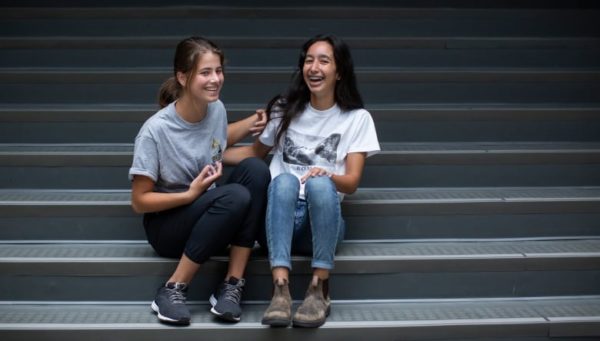
For Grade 12 students Sally Elhennawy and Vladyslava Kozachok, who attend Vancouver’s University Hill Secondary School, working to the limits can be seen as a badge of honour.
“It’s almost like the students are feeding off one another’s stress and it’s a cycle,” said Elhennawy, 17. “Like you get a bad mark on one test and it’s like the end of the world, and people’s definition of bad mark has really gotten out of control … like, a 90.”
University Hill Secondary School, a public secondary school on the University Endowment Lands near the University of British Columbia, is an academically oriented school.
Kozachok, 16, says there’s immense pressure on the students to succeed and get into their school of choice.
“You have to really do something exceptional,” she said, saying volunteering a few times a week doesn’t cut it anymore. “For kids who want to go to Ivy League schools … they read stories about kids who’ve like made scientific discoveries in high school or who work in labs full time.”
Elizabeth Watanabe, who has worked as a counsellor at the school for the past 11 years, says this kind of stress is noticeably higher than it was a decade ago.
“We have definitely seen an increase in the stress and anxiety, not just around post-secondary education, although that’s a big piece of it,” Watanabe says.
She says in addition to the regular stress and anxieties of being a teen, there is a lot of competition and pressure among the students for limited post-secondary spots.
“[Many think] if I do not get into this program at this school, I am not going to be successful and I am not going to get where I want to get to in life,” Watanabe said.
“That’s simply not true.”

In response to the high level of anxiety, Watanabe now co-facilitates an after-school course called the brain study program. In it, students learn about the brain’s physiological and cognitive response to stress and anxiety and how to better cope with it through things like mindfulness, self-awareness, and positive psychology.
As part of the program, students then go out to their peers, teachers and parents to talk about stress and anxiety in the hope of changing the culture around self-care.
Both Elhennawy and Kozachok are members of the group.
“A lot of students genuinely just don’t know that relaxing and recovering is something they should be doing and something that’s helpful for them,” said Elhennawy.
“We really had the chance to have conversations about it to our staff, to our students [and] to our parents. I think we’ve done quite a good job in starting to reduce some of that stress in our school and give students tools to be able to do that for themselves.”
Watanabe hopes programs like these will be prioritized by the provincial government.
“If kids are not learning how to be healthy, happy human beings as adolescents, their chances of being happy, healthy adults are decreased.”
This story is part of a series call Pomp and Pressure, which examines the stresses and choices high school students in B.C. are facing when it comes to post-secondary education. It airs Sept. 3-6 on CBC Radio One’s The Early Edition and On The Coast, with features on CBC Vancouver News at 6 and cbc.ca/bc.